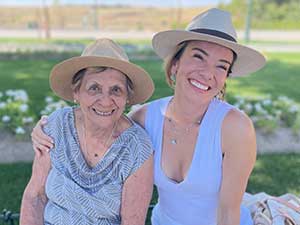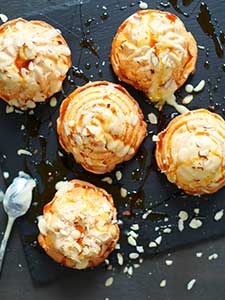
Double Your Impact for the Holidays
Double Your Impact for the Holidays
Your urgently needed year-end gift can go twice as far to provide care and support and accelerate Alzheimer's research this holiday season — and all year long. Show your giving spirit today during this 2x Match Challenge.
Donate NowQ&A With Chef Grace Ramirez: “My Aunt Morela Is The Gatekeeper of Our Family Recipes”
During Hispanic Heritage Month, we are proud to celebrate inspiring Hispanic individuals who are fighting to end Alzheimer’s and all other dementia. Chef Grace Ramirez recently spoke to us about her family’s Alzheimer’s journey with her Aunt Morela.
Chef, tell us about your Aunt Morela.
 My aunt Morela is positive, kind-hearted and generous, so generous. Her – and my grandmother – were the most inspiring women to me. Together they shared the role as the matriarchs of our family. I look up to both of them in terms of their grace and generosity and the way they brought family and food together.
My aunt Morela is positive, kind-hearted and generous, so generous. Her – and my grandmother – were the most inspiring women to me. Together they shared the role as the matriarchs of our family. I look up to both of them in terms of their grace and generosity and the way they brought family and food together.
My family is full of great cooks, but Aunt Morela was “the chosen one.” On Sunday’s everyone gathered at her house. There was not one Sunday where we wouldn’t drop everything and go to Aunt Morela’s. Between cousins and boyfriends and husbands and friends of friends there would be 70 people at her house. She made hosting that many people seem so effortless.
What were some of the first signs that you noticed with your aunt that something might be off?
My aunt is very talkative, very sassy and very sharp. When I was in Spain with her in 2022, I noticed that she was less talkative. I had to really engage her to get her to talk. She could speak to me about old memories but then she would ask me what day it was. She was repetitive and became disoriented easily.
I really noticed that something might be wrong when she became lost in her own kitchen. She would forget where she put the sugar or leave the stove on. The kitchen was second nature to my aunt, so for me to see her leave the stove on or forget where something belonged, it was very shocking to me.
What advice would you give to someone facing Alzheimer’s with a loved one?
I don't wish Alzheimer’s disease upon any family. It’s such a hard disease. But, my advice would be to be loving and compassionate. Your loved one is still there. Maybe they're not there as you once imagined or as you want them to be, but they are still there.
What unique barriers or challenges do Hispanic and Latino communities face in regard to Alzheimer's?
We have a very proud culture. I think because of that we see the disease as a sign of weakness. It is not a sign of weakness. No one should be ashamed of this disease. In addition, there is a lack of information, lack of resources and lack of education among the Hispanic and Latino communities. I know now there are organizations like the Alzheimer’s Association that have information, resources and education for Hispanic and Latino families that are available 24/7 and are available in Spanish and other languages.
You speak a lot about your Latino roots, how has that influenced your culinary background?
Food is something that easily opens the door and heart to any culture. I’ve always felt like I’m waving a little flag, celebrating my “Latino-ness.” I really just want to inspire and mentor people to be proud of where they’re from. Fifteen years ago when I went to the French Culinary Institute in New York City, France, Spain and Europe were considered the mecca of the culinary world. In terms of techniques and the professionalism of the craft, yes, Europe is better. But, when I started traveling to Latin America, I realized that the food in Peru is amazing and the food in Venezuela and Mexico is divine. I’m so proud of what Latin America has accomplished. We have always had amazing food but now it’s exploding.
You’ve spoken about your aunt being the “gatekeeper of the family recipes.” Is there a favorite recipe that reminds you the most of your aunt?
 There’s one dish in particular that embodies my Aunt Morela – it’s called merengón. It’s her staple recipe. Merengón is kind of like a pavlova meets a flan. Most countries know it as floating island or île flottante. It's a dessert consisting of meringue floating on crème anglaise (a vanilla custard). It’s so fluffy and delicious. Nobody makes merengón like her. We would always beg her to make it for any occasion. It was the treat of the family. I tried my best to replicate it and put my own spin on it in my cookbook, La Latina.
There’s one dish in particular that embodies my Aunt Morela – it’s called merengón. It’s her staple recipe. Merengón is kind of like a pavlova meets a flan. Most countries know it as floating island or île flottante. It's a dessert consisting of meringue floating on crème anglaise (a vanilla custard). It’s so fluffy and delicious. Nobody makes merengón like her. We would always beg her to make it for any occasion. It was the treat of the family. I tried my best to replicate it and put my own spin on it in my cookbook, La Latina.
In your opinion, how does food connect us with memories?
That's why I decided to become a chef. Cooking for me is a way to keep memories alive. It takes me back to those Sundays at my Aunt Morela’s, and the smells and the flavors that filled her house.
When I first moved to New York City from Venezuela, I missed my family and my culture. That’s where my cookbook La Latina was born because it was a way to remain connected with my family, with my roots and with the memories of how I grew up.
Our family recipes were always so loose. My relatives would say, “Add a little bit of this and a little of that.” It was very hard to follow. I was determined to write a book where all our family recipes are written down so that they can be passed along to future generations and live on.
What advice would you give to someone going through this? Is there anything you wish you had known about the disease before experiencing it with your family?
Having a support system is essential. Because Alzheimer’s disease is brutal on the family, and sometimes you don't know where to turn. It’s a disease where you need a lot of hand holding. We’re lucky to have a large, tight-knit family. But, I know of people going through this with very small families and I can imagine how hard it is for them with less support. So, it’s essential to arm yourself with resources and education to help guide you through this process.
Is there any advice that your aunt gave you that sticks with you to this day?
Aunt Morela has always given me great advice. What has really stuck with me is her zest for life. Her zest for life was like the zest of her food. It was so flavorful and so vibrant. She always told me to “live your life.” Do whatever you want, keep going, keep doing your thing.
Related articles

The first survivor of Alzheimer's is out there, but we won't get there without you.
Donate Now
Learn how Alzheimer’s disease affects the brain.
Take the Brain Tour
